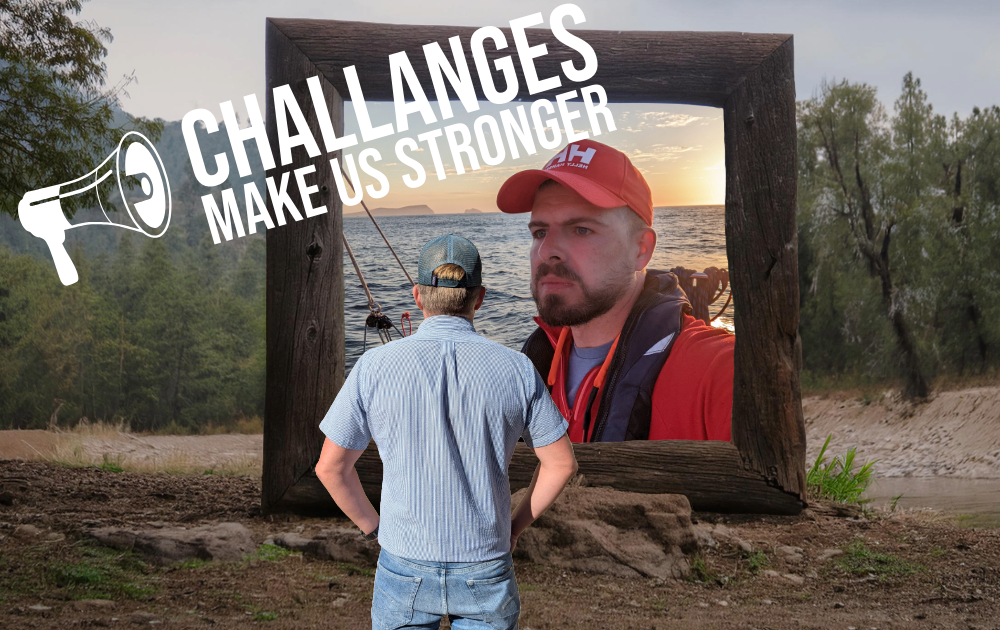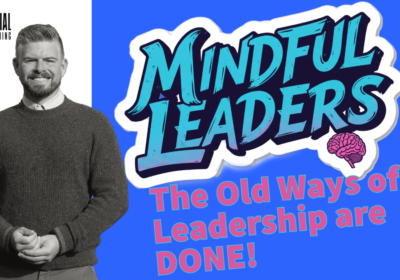The Dynamic Duo for Powerful Leadership

Just now, when writing this article, I am thinking back to one of my last sail races. The wind in my hair, the boat slicing through the waves. It’s peaceful and thrilling all at once. That’s the magic of sailing. This experience makes me dream of sailing to Fiji one day (or actually around the world), envision the beautiful waters, the vibrant marine life along the way and of course the nights filled with stars. This dream represents my pursuit of challenges and the desire for extraordinary experiences, which are essential in leadership.
But if you’ve ever been sailing or even sailing racing, you know it’s not always smooth sailing. Imagine this: you’re approaching a turn, the wind’s howling, the crew’s ready to jibe. The boom swings across with incredible force – one mistake and someone could go overboard. It’s a calculated risk, part of the thrill – part of the break we need to perform our best!
We sail, we lead, because challenges make us stronger.
It’s about being prepared, staying calm under pressure, making the right call even when the stakes are high. That’s what makes a great leader on the water, in the office or at home. Just like on a sailboat, leadership demands an immense awareness of both internal and external conditions. Before you jibe, you assess the wind, the waves, and the balance of the boat. Similarly, a leader must navigate their own emotions, their team’s dynamics, and the tasks at hand. It’s not about charging ahead blindly, but about self-understanding and emotional mastery.
Think about leading a team during a crisis. Let me share a personal sailing experience highlighting this. One skipper I sailed with had this incredible ability to stay calm under pressure. Even when things got heated, he’d pause, assess the situation, and respond thoughtfully. His emotional intelligence inspired the team to persevere, proving that a steady hand at the helm is crucial.
It was on a sail race down from Santa Barbara to King Harbor in California. The sun had just set, and the wind was blowing fiercely. I was responsible for the foredeck, and although I’m responsible for the foredeck, I couldn’t help but be constantly reminded of how little I truly knew about sailing (imposter syndrome?). So I was standing close to the mast when the skipper suddenly yelled, “Hold yourself!” I had no idea what was coming! I grabbed the mast, and within seconds, the boat was nearly completely horizontal, the leeward side almost submerged in the water! I wasn’t scared; there was no time to be scared!
For leaders like you, self-awareness is key. When emotions run high or quick decisions are needed, it’s easy to lose your footing. Executive coaching can be a powerful tool for developing emotional intelligence and honing your decision-making skills. If you’re ready to embark on a journey of self-discovery and leadership development, executive coaching can be your compass – below we will share more on how we do it!
The Blind Spots of Inexperience: The Dunning-Kruger Effect and Leadership
Twenty years ago, two Cornell psychologists, Dunning and Kruger, demonstrated that individuals with less expertise often struggle to see the limitations of their knowledge, unlike those who are more experienced. The study Unskilled and unaware of it by psychologists David Dunning and Justin Kruger revealed that while only 12% of highly competent individuals tend to overestimate their abilities, a striking 88% of individuals who are still developing their skills do so. This phenomenon, known as the Dunning-Kruger effect, highlights how individuals with lower competence are more prone to misjudging their abilities. This concept also resonates with Carol Dweck’s Mindset, which suggests that a fixed mindset can hinder personal growth, development, and self-awareness in leadership. Similarly, a fixed mindset in leadership can prevent individuals from recognizing their limitations and evolving effectively.
Let’s go back to the sailing race; When I stood on a boat during the race, everything seemed calm and safe to me. I was unaware of the potential dangers. My lack of experience prevented me from recognizing the warning signs that were clear to the skipper. Without his expertise, I would have likely gone overboard. What was obvious to him was invisible to me, highlighting the importance of self-awareness and experience. Similarly, self-awareness enables leaders to not only understand their strengths and limitations but also identify potential risks and challenges that may not be immediately recognizable.
Navigating Leadership Challenges with Emotional Intelligence: The Executive Coaching Advantage
Another key skill for leadership development is emotional management. Daniel Goleman, in his book Emotional Intelligence: Why It Can Matter More Than IQ, and his article “What Makes a Leader?”, has shown that leaders with higher levels of emotional intelligence are three to four times more likely to see their teams achieve high levels of performance, particularly during times of stress or pressure. This emphasizes the importance of self-awareness in leadership. This is why many leaders today turn to executive coaches. Executive Coaches provide the tools and frameworks necessary to enhance emotional intelligence and self-awareness, helping leaders make more informed, unbiased decisions and guide their teams or adventures even more effectively within their territories.
Executive coaches, like Sascha Schneider @ Das Potenzial, are invaluable because they help businesses and individuals by posing questions that prompt organizational decision-makers to evaluate their emotions and self-identity more deeply. Unlike other assessment tools that are satisfied with simple responses, they push leaders to examine deeper layers, such as self-interest and preconceptions. This more rigorous analysis helps you make decisions based on facts and objective insights that come directly from you, enhancing your ability to manage everything more effectively and drive positive outcomes.
The Foundation of Unbreakable Success: Self-Awareness and Emotional Mastery
Understanding ourselves as individuals is one of the most powerful tools we have for self-awareness in leadership. This quality is crucial because it enhances decision-making and prioritization by leveraging personal experience. With greater self-awareness individuals can approach situations with an open mind and make well-informed decisions. Self-awareness opens the door to even greater possibilities, helping you to tap into your full potential and enhance your emotional resilience – So that you can navigate any task ahead of you with a stronger sense of purpose, vision and much, much more energy. Emotional intelligence, closely linked with self-awareness in leadership enables individuals to see areas for growth as opportunities to improve (Growth Mindset) strengthen relationships, and enhance your leadership team’s productivity. It helps you to maximize potential and stand out even more within the organizations you lead.
Emotional Mastery: The Key to Unlocking Leadership Potential and Well-being
Leadership begins with self-awareness, a crucial understanding for anyone in a leadership role. It helps leaders set attainable goals more clearly, to act with purpose, and builds a strong foundation for continual progress toward both personal and professional aspirations. Emotional intelligence is fundamental to psychological health and leadership effectiveness, enabling us to recognize and manage our emotions effectively. Executive coaches emphasize that self-awareness not only enhances leadership skills but also supports mental well-being. By fostering self-awareness, we all can positively influence our teams, foster a healthier work environment, and eve extend this impact to their personal lives, benefiting our relationships and overall life satisfaction.
Unlocking your Unbreakable Success: Actionable Steps to Enhance Your Emotional Intelligence
1. The First Step to Emotional Mastery: Becoming a Great Listener, Even When Others Aren’t Great Communicators
Active listening involves going beyond the surface to truly understand the speaker’s message. Not everyone is a great communicator, so we have to be great listeners to get the best out of any situation. We do so without interrupting or making personal judgments. This approach fosters deeper understanding, allowing you to grasp not only the speaker’s words but also their underlying emotions and intentions. Empathy, a cornerstone of emotional intelligence, is crucial for active listening. It enables you to connect with the speaker on an emotional level and appreciate the impact of their words.
2. Beyond the Surface: Deepening Your Self-Understanding for Unbreakable Success and Incredible Impact
We know it is not always easy to sit down and take the time to reflect on one’s life and emotions through writing. Journaling doesn’t necessarily have to be done on paper; what matters is the process of reflecting on the experiences. Self-reflection isn’t just a personal development tool; it’s a leadership superpower. Taking the time to examine your thoughts, emotions, and actions builds the self-awareness needed to navigate complex situations and lead with confidence. Whether you prefer journaling or other reflective practices, the key is to create space for introspection. In executive coaching, we’ll help you develop a personalized self-reflection routine and empower you to leverage these insights for greater leadership effectiveness.
3. Embracing External Perspectives: The Catalyst for Unbreakable Growth
Seeking feedback from diverse sources—coaches, mentors, colleagues, friends, and even family—offers invaluable insights into our blind spots and hidden strengths. While vulnerability is required to truly open ourselves to feedback, the rewards are immense. It allows us to challenge our assumptions, confront our biases, and gain a clearer picture of how we’re perceived by others.
Executive coaching takes this a step further. Through insightful questioning and guided reflection, coaches empower you to uncover your own deeper understanding. This process not only strengthens your interpersonal emotional intelligence but also cultivates the leadership skills necessary to navigate complexities and inspire those around you. By embracing external perspectives and actively seeking growth opportunities, you lay the groundwork for unbreakable success—both personally and professionally.
Conclusion
Self-awareness isn’t just a buzzword; it’s the bedrock of effective leadership and a fulfilling life. By understanding your emotions, strengths, and limitations, you gain the power to make informed decisions, build strong relationships, and navigate any challenge with confidence.
Ready to take the next step towards unstoppable success? Partner with Das Potenzial and Sascha Schneider to cultivate the self-awareness and emotional intelligence that will propel you to new heights, both personally and professionally.


